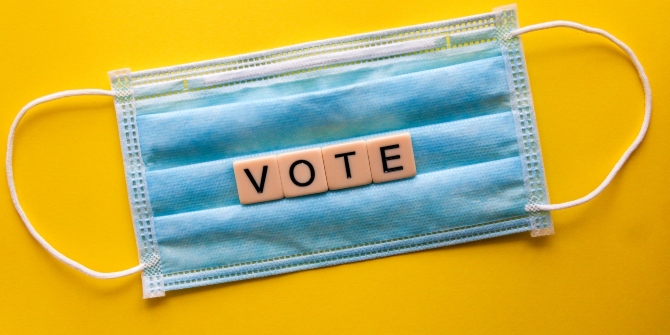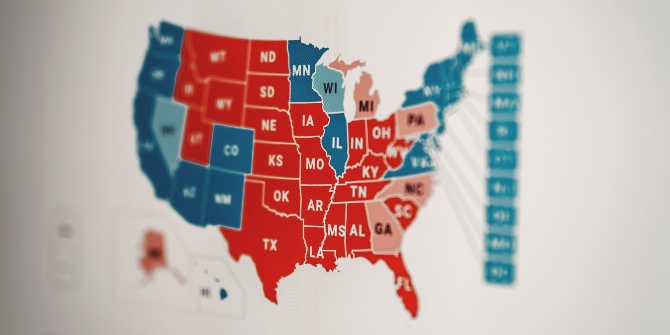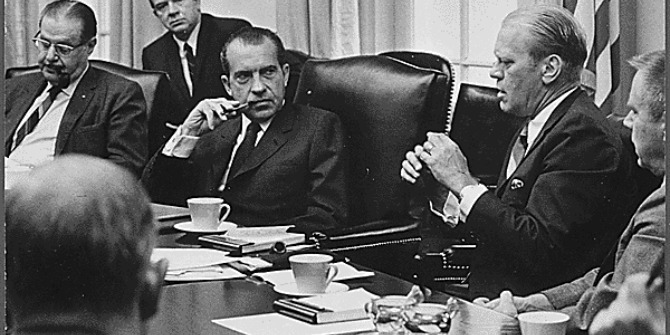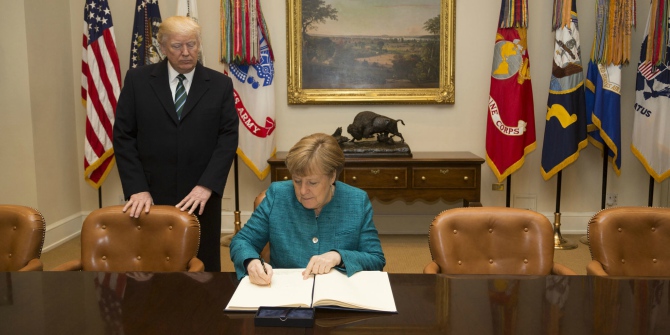

 Despite the doubt and difficulty created by the COVID-19 pandemic, the November 2020 general election occurred successfully. More Americans voted in this election cycle than in any other in the country’s history and turnout reached its highest rate in more than 100 years. Crisis averted? Perhaps not. Madison Imiola, Peter Finn, and Rob Ledger explore the ongoing influence of COVID-19 on US elections and how the pandemic could cause difficulties for voting, potentially for years to come.
Despite the doubt and difficulty created by the COVID-19 pandemic, the November 2020 general election occurred successfully. More Americans voted in this election cycle than in any other in the country’s history and turnout reached its highest rate in more than 100 years. Crisis averted? Perhaps not. Madison Imiola, Peter Finn, and Rob Ledger explore the ongoing influence of COVID-19 on US elections and how the pandemic could cause difficulties for voting, potentially for years to come.
- Following the 2020 US General Election, our mini-series, ‘What Happened?’, explores aspects of elections at the presidential, Senate, House of Representative and state levels, and also reflects on what the election results will mean for US politics moving forward. If you are interested in contributing, please contact Rob Ledger (ledger@em.uni-frankfurt.de) or Peter Finn (finn@kingston.ac.uk).
During the buildup to an unprecedented 2020 election, the COVID-19 pandemic created tremendous concern about access to voting and how votes would be cast. Many state and local governments, including those in traditionally more conservative areas, opted to expand voting options to assist Americans to vote safely during the pandemic. While some, like Vermont and Nevada, are choosing to keep their expanded access in place, many Republican-controlled states have already reversed or limited the expanded voting options they previously introduced in response to the COVID-19 pandemic.
The reason for doing so is clear: with these expanded voting options in place, Republicans lost control of the presidency and their majority in the US Senate. Former President Donald Trump claimed that expanded voting measures like the increased use of mail-in voting led to widespread voter fraud and skewed the election results in Joe Biden’s favor. Such claims have already had serious consequences for Americans’ trust in the election process and serious repercussions for public safety, as evidenced by the January 6, 2021 insurrection at the US Capitol. Despite the facts of the election, which show no evidence of widespread voter fraud, Republican-led state legislatures are pushing back against a potential repeat of a ‘stolen’ election by targeting the new kid on the block: expanded voting measures implemented during the COVID-19 pandemic.
Restrictive voting laws amid the ongoing pandemic
Fueled by misinformation about the security and integrity of the 2020 election, Republican-run states like Georgia have worked swiftly to pass new restrictive voting legislation. With just one bill, Georgia aimed to shorten the time period to apply for a mail-in ballot, limit the number of mail-in ballot drop boxes, and impose stricter voter ID requirements for mail-in voting. Meanwhile, a new law in Wyoming requires voters to now show identification when voting to ‘improve…confidence in Wyoming’s election security’. Alabama has banned curbside voting and instituted new measures for auditing election results to ‘confirm the accuracy of the originally reported election outcome’. Meanwhile, Idaho’s House Majority Leader stated, “Voting shouldn’t be easy” when debating a bill that would make it a felony for any person to drop off more than two mail-in ballots at the post office at the same time, even if a person were dropping off their own ballot and that of friends or family members.
Arguably, expanded voting measures that Republican-backed bills aim to remove (like increased and/or easier mail-in voting) are no longer needed. After all, the US has the tools to control the pandemic with free COVID-19 vaccines widely available across the country for all eligible individuals who wish to receive one. Despite this, the emerging Delta variant has spread quickly across the US amid vaccine hesitancy and anti-vaccination sentiments. A map compiled by the New York Times shows that people are more likely to contract the Delta variant in Republican-led states. These states experiencing the worst impact of the Delta variant have the lowest vaccination rates and – importantly – are also the states restricting or removing opportunities for voters to vote safely during the ongoing pandemic.
As of August 23, 2021, 38.7 percent of Georgia’s population remains unvaccinated, yet the state’s legislature has made it harder for its citizens to vote by mail. Likewise, Wyoming (where 45.4 percent of adults are unvaccinated), Idaho (42.4 percent), and Alabama (41.3 percent) all have large unvaccinated populations yet have implemented new legislation to make voting more difficult despite the ongoing pandemic.

Photo by Glen Carrie on Unsplash
Current forecasts suggest the pandemic will be under control in the US by spring 2022, but experts now predict that the US is unlikely to ever reach herd immunity. In the meantime, neither COVID-19 nor elections have stopped in the US. This year, across the country, voters go to the polls as they vote for mayors, city councillors, judges, and other local positions. In many places, voters must now contend with the ongoing pandemic and new restrictive voting legislation.
It is too soon to tell if COVID-19 will still be affecting Americans when the midterm election cycle begins in 2022, but when that election does come, Americans in at least eighteen states will vote under newly-passed legislation created as a result of the 2020 election cycle and – in many cases – in direct response to expanded voting options first introduced during the unprecedented 2020 election.
Disparate impact of COVID-19 and voting laws on future elections
It is clear that the effects of COVID-19 on American elections did not end with the election of President Joe Biden in November 2020. Though it may be too soon to tell what impact newly passed restrictive voting laws will have on future elections in the US, it is not hard to predict which populations will bear the brunt of that impact, should it occur. As we touch on in a recent briefing paper, historically, voting laws have adversely impacted minority populations like African Americans and suppressed their access to the political process. More recently, the pandemic has disproportionately impacted communities of color and other vulnerable populations. The combination of an ongoing pandemic and concerted efforts to remove the expanded voting options that were implemented in 2020 could have major repercussions for the future of elections in the US. Minority populations could face a ‘double whammy’ of an ongoing pandemic that poses a disproportionate threat to their health combined with reduced opportunities to vote safely because of COVID-19.
COVID-19 has touched every aspect of our lives, and will have a lasting impact on our elections and how we vote. Americans may have skirted disaster in the 2020 election cycle but low vaccination rates and the ongoing spread of the Delta variant all but assure that COVID-19 will still be relevant by the next major US election cycle in 2022. Now, it remains to be seen how safely and efficiently Americans – especially people of color and other vulnerable populations – will be able to vote given the ongoing pandemic and newly-implemented restrictive voting laws.
- This article is based on the briefing paper, Pandemic Politics: Covid-19 and the 2020 US Electoral Cycle.
Please read our comments policy before commenting.
Note: This article gives the views of the author, and not the position of USApp– American Politics and Policy, nor of the London School of Economics.
Shortened URL for this post: https://bit.ly/3CWnKfP
About the authors
 Madison Imiola – Washington State Human Rights Commission
Madison Imiola – Washington State Human Rights Commission
Madison Imiola is an MA Human Rights Graduate (2020) from Kingston University. She now works as a Civil Rights Investigator with the Washington State Human Rights Commission.
 Peter Finn – Kingston University
Peter Finn – Kingston University
Dr Peter Finn is a multi-award-winning Senior Lecturer in Politics at Kingston University. His research is focused on conceptualising the ways that the US and the UK attempt to embed impunity for violations of international law into their national security operations. He is also interested in US politics more generally, with a particular focus on presidential power and elections. He has, among other places, been featured in The Guardian, The Conversation, Open Democracy and Critical Military Studies.
 Robert Ledger – Schiller University
Robert Ledger – Schiller University
Robert Ledger has a PhD in political science from Queen Mary University of London. He has worked for the European Stability Initiative, a think-tank in Brussels, lectured at several universities in London and currently lives in Frankfurt am Main. He is a Visiting Researcher (Gastwissenshaftler) in the History Seminar at Goethe University and also teaches at Schiller University Heidelberg and the Frankfurt School of Finance & Management. He is the author of Neoliberal Thought and Thatcherism: ‘A Transition From Here to There?’






